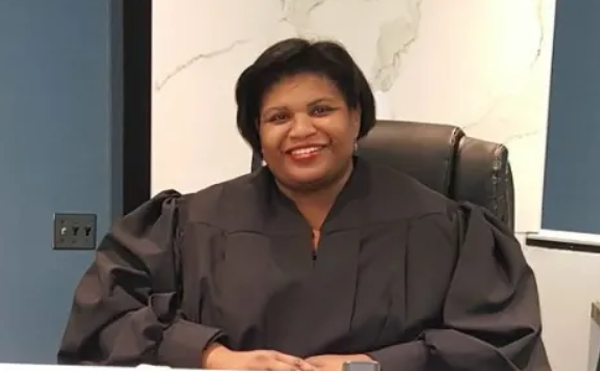Closing arguments in the federal criminal trial of three city employees and the man they allegedly helped to bilk the City of Detroit of more than $2 million were conducted last week, and a jury has begun deliberations.
Though the city employees were indicted for multiple felonies in 2001, they have remained in their jobs and have not been disciplined or suspended.
Prosecutors said the city paid Michael Nickson’s now-defunct company, Four Stars Industries Inc., for pumps and parts that he never delivered to the Lighting Department’s Mistersky Power Plant, which provides energy to city buildings and other properties.
During a two-week trial, prosecutors argued that city Lighting Department employees Leroy Barnes and Gary Spann approved paperwork stating that they received equipment from Nickson, though they knew he had not delivered it.
The government alleged that Nickson bribed Alberta Butler, a former city accounts payable clerk, with pearl earrings, a $300 Coach bag and other gifts so she would process his invoices.
Barnes, Spann and Butler are charged with 10 counts of mail fraud and one count of conspiring to commit mail fraud; each carries a maximum five-year prison sentence and $250,000 fine. Butler is also charged with interfering with commerce. If found guilty, she faces up to 20 years in prison and a $250,000 fine.
Nickson, who ran Four Stars Industries out of his Detroit home, pleaded guilty on the eve of trial last month to 82 counts of mail fraud, financial malfeasance, filing false tax returns and conspiring to commit mail fraud; he faces maximum prison sentences ranging from three-to-10 years on each count. He refused to plead guilty to money laundering and is on trial for that charge.
Defense attorneys for Barnes and Spann claimed during closing arguments that their clients did not know that Nickson failed to deliver the equipment.
Butler’s attorney, meanwhile, said she could not have conspired with Nickson since she did not have the authority to ensure he was paid.
Joe Harris, city auditor general, contacted the police after auditing contracts between the city and Nickson’s company in 1999. Harris’ audit report says that Four Stars Industries was paid well beyond what the city contracts allowed. Harris also learned that the Mistersky plant has no system for tracking equipment, which invited corruption, he says.
“We are doing business in the same way with the same people,” says Harris, referring to Barnes, Butler and Spann.
Butler was transferred to another city department soon after she was indicted two years ago; her former boss investigated the allegations and testified that she had done nothing wrong.
Harris says his audit, which recommended that the Mistersky Power Plant adopt an inventory system, was given to Lighting Department Director Mark Petty, former Mayor Dennis Archer and the Detroit City Council. In 2001, a second performance audit showed that an inventory system still did not exist, said Harris.
Petty declined to comment, referring questions to the Law Department. Ruth Carter, who heads the city Law Department, did not return Metro Times’ phone calls.
Jamaine Dickens, spokesman for Mayor Kwame Kilpatrick, claims that the city had the U.S. attorney’s office investigate the city workers, “which led to the indictments.” Dickens said the city will wait until the trial’s conclusion to decide whether the employees will be disciplined. Dickens also said there are inventory systems in place to prevent future problems at the Mistersky plant.
City Council President Maryann Mahaffey said the council raised questions about the contracts when they learned of alleged wrongdoing. She said the council pressured Petty to adopt Harris’ recommendations.
“We said that the department needs to change, and it’s not just Mistersky,” said Mahaffey.
“Mess” at Mistersky
Harris says he launched audits after getting “a tip from a guy that we were spending considerably more money on pumps and parts than we could possibly use.”
Harris learned that from 1996 to 1999, the city paid Nickson $2.3 million for pumps and parts, though Nickson was contracted to provide only $30,000 in equipment; the council later increased the contract to $900,000.
Harris said he contacted police after his staff could find no evidence that Mistersky received the equipment.
Defense attorney Robert Morgan, who represents Spann, a general maintenance foreman at Mistersky, said in closing arguments that Harris and his staff were unable to locate the specific equipment Nickson was to deliver because Mistersky is a “mess,” with pumps and parts scattered throughout it. He said the massive plant is in worse shape now than before Harris’ 1999 audit.
Barnes, an assistant mechanical engineer, and others are under intense pressure to keep the rundown plant operating, said Patricia Streeter, who represents Barnes.
She said Barnes was not required to inspect equipment delivered by vendors, only the documentation. When Barnes approved Nickson’s invoices, he was only “signing off that the paperwork was complete — that’s all,” said Streeter, who added that Barnes had no motive to help Nickson steal from the city.
Proseuctors presented no evidence that Nickson paid Barnes or Spann for their help; they said Barnes and Spann helped him because he was a friend.
Probe of Butler
The government alleged that Butler and Nickson had a tacit agreement — he would shower her with gifts and she would approve his paperwork so he could be paid. According to federal prosecutors, in addition to the earrings and the Coach bag, Nickson’s gifts to Butler included a computer, college tuition, $2,700, and tickets to sporting events, the symphony and the opera.
An FBI agent testified Butler admitted during an interview, “I know what I did was wrong.”
Her attorney claimed that she was only doing her job by processing Nickson’s paperwork.
Butler’s former boss, Claud Dent, city financial manager, testified that he looked into the allegations because he thought that low-level staff was often unfairly blamed for things they didn’t do. Dent said that he found no wrongdoing, though he was not able to review some of the paperwork between Nickson and Butler. He said he reviewed policies and procedures and spoke to his own superiors, the Law Department and human resources about his investigation.
Dent admitted on cross-examination that he became friends with Butler through the course of his investigation and had dinner with her on one occasion.
Dent also said that in 1999 a new computer system was installed to monitor payments to vendors. He also said the department now prohibits employees from accepting gifts from vendors.
Another audit
The government argued at trial that Nickson laundered money when he attempted to hide stolen city proceeds by buying property and other assets.
His attorney claims that Nickson did not try to hide the money, since there is an obvious paper trail of payments to him.
If Nickson is found guilty, it is up to U.S. District Judge Gerald E. Rosen to decide what will be done with the assets confiscated from Nickson; they include properties in Dearborn Heights and Detroit, two Mercedes Benz automobiles and other assets totaling about $450,000.
Harris plans to do a third performance audit of the Lighting Department this year.
Ann Mullen is a Metro Times staff writer. E-mail her at [email protected]




